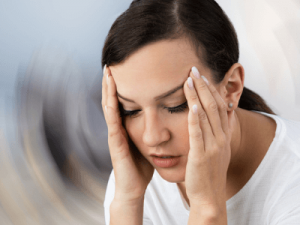What is Vestibular Migraine and what are the symptoms?
Vestibular Migraine is typically characterised by onset of one-sided severe head pain (usually throbbing or pounding) accompanied by photophobia (sensitivity to light), phonophobia (sensitivity to sound), nausea and/or vomiting. Vestibular Migraine is a variant of migraine in which vertigo (a sensation of spinning) or dizziness is the most prominent feature rather than a headache. Approximately 30% of Migraine sufferers will also suffer from attacks of vertigo or dizziness that may or may not also be accompanied by typical migraine headache (1).
Symptoms of Vestibular Migraine may include, but are not limited to:
- Severe one-sided head and/or neck pain (throbbing or pounding)
- Vertigo and/or dizziness
- Impaired balance
- Nausea and/or vomiting
- Motion sensitivity
- Blurred vision or visual ‘aura’ (spots/shadows in vision)
- Photophobia (sensitivity to light)
- Phonophobia (sensitivity to sound)
- Perceived hearing loss and/or tinnitus (ringing in the ears)
- Anxiety/Panic
These symptoms may behave in attacks lasting a few minutes to 72 hours and may resolve completely between episodes and are usually preceded by ‘warning signs’ that a migraine is about to commence. Other sufferers may feel a constant level of motion sensitivity, impaired balance and visual symptoms which impair their day-to-day function.
What causes a Vestibular Migraine?
The exact mechanisms of vestibular migraine are not completely understood, however, there are a number of theories on the subject. It is believed Migraine is a complex process caused by both neurological and vascular (blood flow) issues whereby for one reason or another neural signals are spread across the brain followed by activation of pain receptors in the brain stem, which is near the area of the brain that triggers vertigo. The release of neurotransmitters causes dilatation of blood vessels near the scalp which in turn causes the pain experienced (2).
How is Vestibular Migraine diagnosed?
A diagnosis of vestibular migraine is usually based largely on a thorough history of symptoms, along with a number of tests to rule out other conditions which may have a similar presentation. These tests may include (if necessary) a CT or MRI of the brain and Vestibular Function tests, such as the head impulse test – which tests the function of the inner ear. Usually, these tests will be completely normal, and therefore vestibular migraine is usually ruled in as a cause for the symptoms.
How is a Vestibular Migraine treated?
1. Migraine Trigger Control
A migraine trigger can be almost anything inside or outside the body that can provoke a migraine. Each migraine sufferer has different sensitivities, so not all triggers may provoke an attack in all sufferers. You may be asked to keep a migraine diary to assist in identifying some of your triggers, therefore helping to prevent your migraines from occurring.
Common migraine triggers can include the following:
Dietary: Some migraine sufferers have been known to have a sensitivity to specific foods, being that these foods flare up their migraine symptoms (3). It is important to note that skipping meals or fluctuations in blood sugar may also trigger migraine symptoms. Common foods include:
- Aged or ripened cheeses: (e.g. cheddar, parmesan, feta)
- Yoghurt/Sour cream
- Processed meats: (e.g. ham, bacon, salami, hot dogs)
- Caffeine: (e.g. coffee, tea, cola, chocolate)
- Alcohol (e.g. Red wine, Beer)
Environmental: such as bright lights, patterns, loud noises, strong odours, changes in weather, changes in pressure (i.e. air travel)
Emotional: Stress and anxiety are common triggers for migraine; your Vestibular Physiotherapist may recommend sessions with a counsellor if you have particularly high levels of stress which may influence your migraines.
Hormonal: Hormonal fluctuations may trigger migraines and can be affected by contraceptive pills, estrogen supplements, menstrual cycles, pregnancy or menopause.
Sleep disturbance: Lack of sleep, disturbed sleep, or too much sleep may trigger a migraine.
2. Vestibular Rehabilitation
Along with medication, vestibular rehabilitation exercises may be provided to help the brain adapt to the altered signals resulting from vestibular migraines in a process called compensation. These exercises may include exercises to stabilise vision, exercises that help to desensitise the body to movement and also exercises to help to restore your balance. Aerobic exercise such as walking will also be encouraged. Your Vestibular Physiotherapist will prescribe these exercises based on a comprehensive initial assessment (4).
3. Medication
- Medication: Drugs that are taken only when there is an attack in order to stop or shorten the length of the attack or to reduce the symptoms. (e.g., Aspirin, Paracetamol, Ibuprofen, Stemetil and/or Valium).
- Preventative medication: Drugs that are taken daily to prevent migraine from occurring such as migraine-specific drugs, Blood Pressure medications, Antidepressants, and Anti-Seizure medications. These are generally prescribed by a specialist Neurologist called a Neuro-Otologist who specialises in Vestibular Migraine (5).
- Supplements: Certain supplements such as magnesium and riboflavin (Vit B2) and CoQ10 have been shown to assist in preventing vestibular migraine (6).
If you have any further questions with regards to this information, please contact us at Brunswick Health on (03) 9380 8099.
References:
- Savundra PA, Carroll JD, Davies RA, Luxon LM. Migraine-associated vertigo. Cephalalgia. 1997;17(4):505-10; discussion 487.
- Baloh RW. Vestibular Migraine I: Mechanisms, Diagnosis, and Clinical Features. Semin Neurol. 2020;40(1):76-82.
- Hindiyeh NA, Zhang N, Farrar M, Banerjee P, Lombard L, Aurora SK. The Role of Diet and Nutrition in Migraine Triggers and Treatment: A Systematic Literature Review. Headache. 2020;60(7):1300-16.
- Gottshall KR, Moore RJ, Hoffer ME. Vestibular rehabilitation for migraine-associated dizziness. The International Tinnitus Journal. 2005;11(1):81-4.
- Power L, Shute W, McOwan B, Murray K, Szmulewicz D. Clinical characteristics and treatment choice in vestibular migraine. Journal of Clinical Neuroscience. 2018.
- Beh SC. Victory over Vestibular Migraine: the ACTION plan for healing and getting your life back2020.


